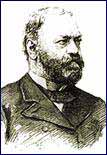Louis Adolphe Cochery
Louis Adolphe Cochery (born August 26, 1819 in Paris , † October 13, 1900 there ) was a French politician .
Life
Louis Adolphe Cochery was educated at the Collège Bourbon, then studied law and became a lawyer in 1839. As such, he settled in Paris. After the February Revolution of 1848 he was briefly head of the cabinet of the Minister of Justice, then substitute for the general procurator. However, he soon resigned this post and returned to the lawyer, particularly to plead in political and press trials. After the coup of Napoleon III. (December 2, 1851) he devoted himself to journalism during the Second Empire , published the Avenir nationally and in 1868 founded the paper L'Indépendant de Montargis in the Loiret department .
In the new elections to the legislative body in May 1869, Cochery appeared in the Loiret department as an independent candidate and was shortlisted to defeat his official competitors. He took his seat in the left center of the chamber. On July 5, 1870, he gave through his interpellation concerning the Prince of Hohenzollern Spanish throne candidacy Gramont to the warlike speech of July 6, occasion, but then voted against the declaration of war on Prussia. On the day of the fall of Napoleon III. (September 4, 1870) he tried unsuccessfully to mediate between the legislative body and the provisional government in the town hall and then went to Orléans , where he was appointed commissioner general of the national defense of the Loiret department. Even after the Germans took the city, he stayed at his post to look after the prisoners and wounded. Then he escaped to Tours , where he proposed to Adolphe Thiers that negotiations be initiated on an armistice in the Franco-Prussian War . With this aim he returned to Orléans and turned to General von der Tann , who was annoyed that Cochery had passed the enemy lines twice without authorization and threatened him with the application of martial law . In the end, however, Cochery received a permit for himself and Thiers to Versailles , where both of them went to negotiate an armistice at the end of October 1870. Although this mission was unsuccessful, Cochery won Thiers' approval through the skill he showed and remained his loyal supporter and friend from then on.
Elected to the National Assembly by the Loiret department on February 8, 1871 , Cochery joined the Left Center but gradually moved to the Republican Left. He was a permanent member of the budget commission. Member of the Chamber of Deputies since February 20, 1876 , he was appointed a member of the World Exhibition Committee in 1877. He also served as President of the General Council of the Loiret Department from 1877-1900.
After the formation of Jules Dufaure's cabinet (December 1877), Cochery was Undersecretary of State in the Treasury and, from March 1, 1878, Director of Post and Telegraphs, in which latter capacity he was promoted to Ministerial on February 5, 1879. Because of his significant achievements as Minister of Posts and Telegraphs, he retained this post in subsequent cabinets until the fall of Cabinet Ferry II (March 30, 1885). In this function, he chaired the Universal Postal Congress in Paris in 1878 , founded the École supérieure de télégraphie on November 4, 1878 (predecessor of today's École nationale supérieure des télécommunications ), took part in the telegraph congress in London , and initiated the International Electricity Exhibition in Paris 1881 and chaired the first conference on the protection of submarine cables .
Since January 5, 1888, Cochery was a lifelong senator and was active there until his death. He died in Paris on October 13, 1900 at the age of 81 and was buried in the Père Lachaise cemetery. His son Georges Cochery (1855–1914) was French finance minister from 1896–98 and 1909–10.
literature
- Louis Adolphe Cochery . In: Meyers Konversations-Lexikon . 4th edition. Volume 4, Verlag des Bibliographisches Institut, Leipzig / Vienna 1885–1892, pp. 189–190.
Web links
- Biography of Louis-Adolphe Cochery on the website of the Sénat français (French)
| personal data | |
|---|---|
| SURNAME | Cochery, Louis Adolphe |
| BRIEF DESCRIPTION | French politician |
| DATE OF BIRTH | August 26, 1819 |
| PLACE OF BIRTH | Paris |
| DATE OF DEATH | October 13, 1900 |
| Place of death | Paris |
